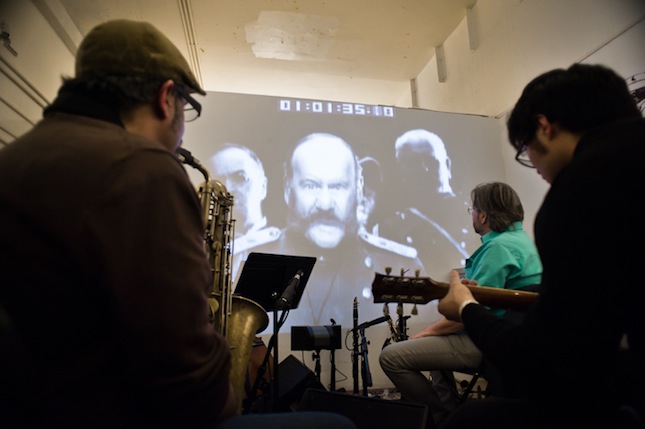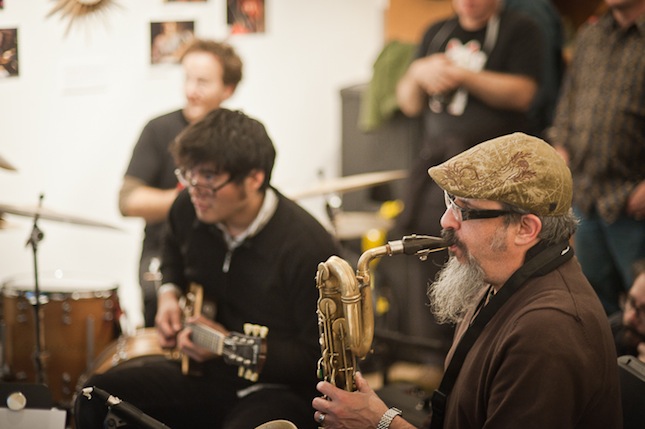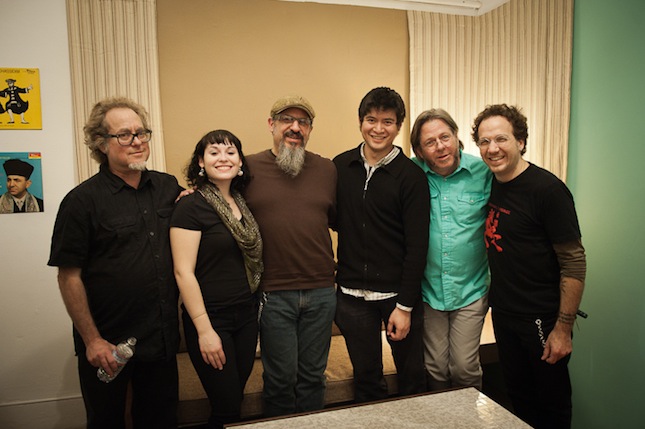Russian Villagers Brutalized in Outer Mission; Steve Berlin Saves the Day
-
Russian villagers were brutalized last night by a vicious local magistrate, and bystanders did nothing but stand and listen.
The situation was less dire than that depiction might suggest. The brutalization occurred onscreen, and the bystanders were attendees of the first concert of the Tikva Records pop-up store’s December event series.
What they were witnessing was a black and white Russian silent film that dates from 1928. The film is titled His Excellency. The original Russian is Yevo Prevoshoditelstvo, and it has also been known as Seeds of Freedom. It tells the story of Jews in the iron grip of a regional official who is less like a mayor, and more like the masochistic warden of his own private prison.
What they were listening to was a new, original musical score being performed live for the very first time. The music was composed by Steve Berlin, best known as (1) the saxophonist in Los Angeles’ famed Los Lobos and (2) that band’s sole Jewish member. His hand-picked crew consisted of drummer Scott Amendola, a veteran of Bill Frisell’s band; multi-woodwind player Ralph Carney, of Tom Waits’ group; keyboardist Eric Drew Feldman, sideman of the late Captain Beefheart; as well as cellist Crystal Pascucci and guitarist Karl Alfonso Evangelista. The Tikva Records space is tight, and Amendola’s drums were separated from the crowd by a bright yellow band of fire-department caution tape.
As Berlin explained to us in the week leading up to the show (“Los Lobos’ Steve Berlin to Score 1928 Russian Silent Film Live”), the way he prepared the music was to develop original themes for various aspects of the movie, such as the indigent Jews in hiding, the title character enjoying the comforts of his reign, and a climactic scene that occurs in a synagogue. He then provided these themes to the musicians, who improvised on them as the film progressed. As he put it at the time. “[W]e’ll riff on those as the intensity of the activity on the screen merits.”
The result was a marvel. The film ran for almost an hour and a half, moving back and forth between the wealth of the ruler of the town and the poor folk who were working toward a revolution. In addition to the synagogue scene, the film has two circus scenes, numerous battles, and instances of resistance scheming that could be right out of The Battle of Algiers or Army of Shadows.
The score likewise ranged in its musical components. Much drew from the alternately dirge-like and joyous sounds of klezmer, and there was martial music that mocked His Excellency’s stature, as well as riffing appropriate to the circus scenes (one of which was particularly surreal). Amendola, on drums, was the most militant of Berlin’s players, in that he was often called upon to signal the violence occurring on the screen, from hard swipes at his drums that paralleled the whipping of a poor man, to rim shots that coincided with gun shots. (The image of a man killed by a bullet eerily resembled Robert Capa’s famed photograph of the “falling soldier.”) The klezmer sounds were especially enjoyable during scenes in a tailor’s shop, the back room of which doubled as a meeting room and makeshift hospital.
Carney had about twice as many instruments as there were musicians, seemingly one for each major scene change. The versatility allowed him to tailor sounds specifically for what was on screen (for example, when a shofar was played in the temple, he himself played a shofar). Carney’s standout moment may have been when he pulled out what appeared to be the bell of one of his woodwinds. Using it, he proceeded to serve as a kind of ventriloquist for a woman seen screaming in the film. But true to the ingenuity of Berlin’s score, and of the improvisers’ extrapolations from it, Carney then morphed that horn sound into something more like an expression of the woman’s deepening mental anguish. It was an especially dark moment in a richly dark film.
The movie His Excellency was made available to Berlin and to Tikva Records by the National Center for Jewish Film at Brandeis University, and Berlin has said he has hopes for future performances.
Be sure to read our interview with Steve Berlin, and to check out the calendar of all the other events occurring at Tikva Records in San Francisco throughout the month of December.
Photos by Lenny Gonzalez (lennygonzalez.com).






One Response and Counting...
The film was fascinating and the music was brilliant. Thank you for putting this together!